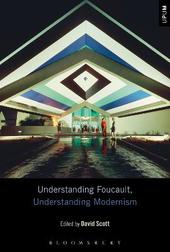
|
Understanding Foucault, Understanding Modernism
Paperback / softback
Main Details
Description
Michel Foucault continues to be regarded as one of the most essential thinkers of the twentieth century. A brilliantly evocative writer and conceptual creator, his influence is clearly discernible today across nearly every discipline-philosophy and history, certainly, as well as literary and critical theory, religious and social studies, and the arts. This volume exploits Foucault's insistent blurring of the self-imposed limits formed by the disciplines, with each author in this volume discovering in Foucault's work a model useful for challenging not only these divisions but developing a more fundamental interrogation of modernism. Foucault himself saw the calling into question of modernism to be the permanent task of his life's work, thereby opening a path for rethinking the social. Understanding Foucault, Understanding Modernism shows, on the one hand, that literature and the arts play a fundamental structural role in Foucault's works, while, on the other hand, it shifts to the foreground what it presumes to be motivating Foucault: the interrogation of the problem of modernism. To that end, even his most explicitly historical or strictly epistemological and methodological enquiries directly engage the problem of modernism through the works of writers and artists from de Sade, Mallarme, Baudelaire to Artaud, Manet, Borges, Roussel, and Bataille. This volume, therefore, adopts a transdisciplinary approach, as a way to establish connections between Foucault's thought and the aesthetic problems that emerge out of those specific literary and artistic works, methods, and styles designated "modern." The aim of this volume is to provide a resource for students and scholars not only in the fields of literature and philosophy, but as well those interested in the intersections of art and intellectual history, religious studies, and critical theory.
Author Biography
David Scott is Associate Professor and Coordinator of the Philosophy Program at Coppin State University, Baltimore, MD, USA. Originally trained as a fine arts painter, he holds a doctorate in Literature from the University of Virginia and a doctorate in Philosophy from the University of Memphis. He is the author of Gilbert Simondon's Psychic and Collective Individuation (2014), along with several published articles and chapters on Bergson, Heidegger, Deleuze, and Merleau-Ponty, and translator of Deleuze's first published work on Hume's philosophy. Scott publishes on intersections of art and philosophy, as well as on race and social and political theory.
ReviewsFoucault's radical and incisive analysis of modernity has had a transformative effect on our understanding of history. This wide-ranging volume allows us to connect that analysis to his more neglected account of aesthetic modernism. It gives us a fuller and richer picture of a thinker who remains indispensable. * Simon During, Australian Research Professor, University of Queensland, Australia * David Scott has brought together an exceptional group of scholars to explore the range of Foucault's penetrating analysis of modernity. The tripartite structure of the volume-which includes close readings of Foucault's major books, analyses of Foucault's engagements with modernist literature and art, and a glossary of Foucault's key concepts-makes this a delightfully accessible and comprehensive guide to Foucault's work. * Daniel W. Smith, Professor of Philosophy, Purdue University, USA * Michel Foucault (1926-84) devoted path-breaking works of critical analysis to deciphering "games of truth." One of his notable preoccupations was the problem of historical discourse and its pronounced tendency toward periodization. The essays in the present, handsomely designed volume trace the mercurial philosopher's many lines of inquiry converging on the problematic notion of modernity. Like other volumes in the Understanding Philosophy, Understanding Modernism series, the book comprises three main sections, one on conceptualizing, another on aesthetics, and a third offering a glossary. Most of the 19 contributors are young scholars working in the areas of philosophy, English, art, ethics, and religion-a range that lends this collection a cutting-edge flavor-and most are from North America, though universities abroad are represented. The essays in the first two sections are well crafted, insightful, and scholarly; the brief glossary and essays in part 3 highlight Foucault's pivotal terms and make the volume especially useful for nonspecialists. ... Summing Up: Highly recommended. Lower-division undergraduates through faculty. * CHOICE *
|